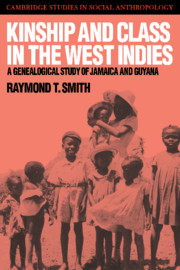Book contents
- Frontmatter
- Contents
- Preface
- Maps
- 1 Introduction: assumptions, procedures, methods
- 2 Kinship, culture and theory
- 3 What is kinship in the West Indies?
- 4 The structure of genealogies
- 5 Marriage in the formation of west Indian society
- 6 Modern marriage and other arrangements
- 7 Sex role differentiation
- 8 Household and family
- 9 Conclusion
- References
- Index
- Cambridge Studies in Social Anthropology
6 - Modern marriage and other arrangements
Published online by Cambridge University Press: 29 October 2009
- Frontmatter
- Contents
- Preface
- Maps
- 1 Introduction: assumptions, procedures, methods
- 2 Kinship, culture and theory
- 3 What is kinship in the West Indies?
- 4 The structure of genealogies
- 5 Marriage in the formation of west Indian society
- 6 Modern marriage and other arrangements
- 7 Sex role differentiation
- 8 Household and family
- 9 Conclusion
- References
- Index
- Cambridge Studies in Social Anthropology
Summary
[Weddings] not so plentiful with us you know. I couldn't tell you the last wedding I did go to. Now death and sickness, that more common and we all pull together then.
Jamaican InformantThere is a marked resemblance between the pattern of unions and residence we have examined for coloured women like Lizette Nash and her mother Eleanor Price (page 97 above), and many of our twentieth-century lower-class informants. It is fashionable to stress the African origin of the West Indian lower class and to look for the possible continuities in custom, but that can be as misleading as to imagine that slavery wiped clean the slate of history leaving nothing but anarchy, or anomie, in its trail. Slave society or, more broadly, creole society, was created out of many historical traditions under definite social, economic and political circumstances, as was the society that succeeded it. The modern lower class does not exist in isolation; its most ardent collective desire is to escape from its class position. In the absence of any clearly formulated consciousness of how that class position is created, or of any viable alternative to it (despite some evidence of beginnings in that direction), one finds a curious blend of emulation of, and contempt for, the standards and values of the middle class. Class is a matter of relations within a social formation; in this case a dependent social formation.
- Type
- Chapter
- Information
- Kinship and Class in the West IndiesA Genealogical Study of Jamaica and Guyana, pp. 110 - 133Publisher: Cambridge University PressPrint publication year: 1988



